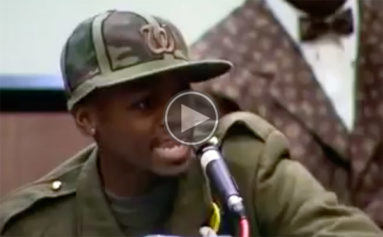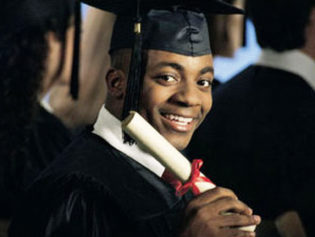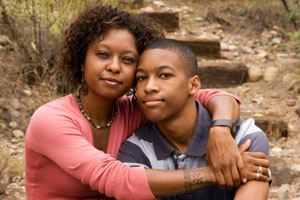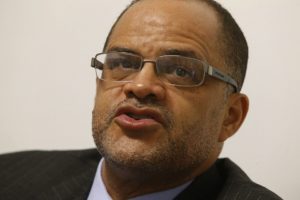
ABS: When we look across the landscape and consider the lives of Black boys and we look at all the wonderful work you guys have done at the Eagle Academies, what do you think are some of most surprising findings about how easy or not so easy it is to turn Black boys around? Is it as hopeless as so many people seem to think it is?
David Banks: It is absolutely not hopeless, not at all. In fact, it’s very fixable. Just requires the will for us to fix it. And therein lies the paradox. It’s very simple but complex at the same time. First of all, what I have long felt, having been the oldest of three boys my mom and dad raised in New York City, and all of us have our own measure of accomplishment, beyond that having raised four children of my own, including three sons, and every one of them are college graduates, is that if I can do it, my brothers and I can do it, my kids can do it, it’s entirely impossible for all of our children, our boys and girls.
Kids have got to see the light at the end of the tunnel. Ultimately the work we do at Eagle is to try to get the light to come on inside of them. When that light goes on inside of them, it helps them as they begin to see the lights and opportunities in front of them. What I mean by that is something as simple as, we say we want all of our young men to go to college. In this new century, the skills they will need, they will need a college degree even to get in the game, but for some many of our young males, they’ve never even set foot on a college campus.
“Speaking to boys in amorphous terms doesn’t work.”
You got to show them real practical things that they can wrap their arms and their minds around. When you wrap your mind around it in a real way, that’s what helps the light to come on. As an example, we take all our young men at Eagle across all our schools in the summer to visit two or three colleges before the official school year even begins. It’s one of the first things we do in the first two weeks during the summer bridge program. We all need to do that. Make sure your kids go and visit college. It doesn’t have to be some long trip. It could be something right there in the city. But they’ve not seen it. They haven’t walked the green of a college campus. Haven’t walked into somebody’s dorm room, or gone into the student center or saw a fraternity step out and do a step show. These are things a lot of us take for granted, but when you collectively ask these young men, I have over the years, when have you visited a college, it’s amazing to me how many have never even visited a college, yet we say we’re preparing them for college. A lot of girls are able to get some of this in their mind’s eye. You can talk to them about it, they can read about it, they can get excited about it. Boys have got to step foot on a campus. They’ve got to be able to walk around, speak to students, see students who look like them walking around the campus saying I came from the inner city. This is my experience and I was you a few years ago. Those types of things for boys are really important. I didn’t realize that quite so much when I first started doing this work. You have to demystify the process.
“Boys as a group are very tactile learners. They have to see it, smell it, touch it, feel it. That’s what makes it come alive.”

I describe the hip hop generation as the fatherless generation. Hip hop stars, athletes coming up, when you hear their stories almost all of these guys have grown up without fathers. They have had to create their own definition of manhood in the absence of fathers to show them how to do it. That’s what we try to do. Even for those not at Eagle, it’s about finding men to stand in the gap for your young men. It’s critical to find men who will do that. I’ve heard it so many times, even when they’re married and have their own children, it’s a pain that never seems to go away. As they try to rationalize why my father was never involved in my life and they thank God for the football coach or the basketball coach or somebody who stood in the gap to play that role.
The young men themselves are so full of potential. Black boys have been studied and examined so much, you would think they were species from another planet.
“They have the same wants, needs, desires as everybody but they recognize, they’re not conscious in terms of recognizing it but they feel it in their soul, that they are under attack.”
They see it in the subliminal messages that are sent to them. They can’t always make sense of it, but they know it. That’s why they come to a place like we have, a place that wraps its arms around them and says, You can take the armor off. They are so deeply appreciative, because it’s an armor that’s heavy. It’s an armor they have to wear when they’re 10 and 12 years old and they have to be the man in their own house. Then they have teachers that don’t believe in them, and school is boring and teachers don’t cater to the energy that boys have. They get it. They can’t always articulate it, but they feel it and they don’t know how to get out of it. So they keep that armor on, to protect themselves. To protect themselves from the low expectations that people have of them. To protect themselves from all manner of evil that exists in the neighborhood and all around them. The armor is heavy, the armor will wear you down. You need it, man, to protect you, but when they come to a place like ours it helps them.
Even for those that don’t go to an Eagle Academy, if you’re just a regular parent, raising your kid, one of the things I talk about in the book is developing that mental map. Where are the resources in your community that you can tap into? All too often our communities are referred to in a deficit model, as though there’s nothing good happening in our communities, all we want to do is get our kids out of here. I don’t think there’s anything further from the truth.
“There are wonderful things happening in many of our communities and lots of resources people can tap into.”
I had a cousin that lived right across the street from the Brooklyn Museum and the Botanical Garden in Prospect Park. He literally lived right across the street. And I used to take my kids there on Saturday to visit all these places. And when I was done I would go visit him and his three kids and they had never visited the place. I’m like, It’s across the street! They got an exhibit on this and on that. But he wasn’t enlightened in his own mind. So he wasn’t seeing to it that his kids were enlightened. I always talk about as a parent it’s your responsibility not to roll over on a Saturday morning and let the television raise your kids. You are absolutely responsible for spending the time to give them what they need. There are things right there in the community to give them what they need. Can make all the difference in the world in terms of making that light go on inside a kid and make them realize what their potential can be. It’s up to adults to do that. Far too many adults try to take the lazy way out. We’ve got to continue to call people in the community out on that.
“You’ve got to be engaged. There are no shortcuts for that.”
There’s a classic line from the movie ‘Hotel Rwanda’ when Don Cheadle looks up and tells the group, No one is coming to save us, we’ll have to save ourselves. I live by that. That one line really touched me.
“Nobody is coming to save us.”

ABS: We’ve seen studies that have said in order for black kids to perform academically they have to have a sense that the people in the institution care about them, yet that’s not the situation many of our boys and children face. Are there ways parents can get around that, if your kids are in a school like that?
You can absolutely overcome it. That’s tough, when people you’re entrusting your children with, who spend more time with them then they do at home, don’t believe in them. Particularly with boys. There’s a lot of research around relational learning for boys. Boys have to really feel like you care about them. And when you don’t, they internalize that and it starts a whole downward trend. I think there are people who really don’t care about our boys. The only way you can offset that as a parent, you have to work overtime.
“It’s about giving your kids a level of confidence in themselves and letting them know as well that they will meet significant challenges and people who do not believe in them.”
That can’t be something that they walk into and then are surprised by. It’s incumbent upon us as adults to say not that everybody’s racist, not at all. But that they are going to come into contact with adults who do not believe in them and who will work against them. And as they encounter that, they have to make their parents aware of it.
I had a teacher when I was in the 5th grade, Miss Rosenberg. I was a very bright kid, I did very well in school. And she was really, you could see, she was not a fan of my confidence. She used to make little remarks. I used to make sure my mom and dad were aware of that. They had to come up to school on several occasions, have a conversation with her, as well as with the principal and assistant principal, to talk about inappropriate comments being made by this woman. I was always in the top class, but when I left her class in elementary school, when I went to middle school, all the kids who were in my class from the first grade on were all in different classes. I didn’t know why. I was in middle school less than a month and the work was so easy. She had put me in one of the lower classes in middle school. There was a white teacher there, Mr. Brown. He had me do some assignments, by the time I got to the second or third assignment, he said, you’re not supposed to be in this class. He said have your mother and father contact us at the school. They went and checked it out and it was that damn Miss Rosenberg who did it. We had no way of knowing until I was already in it.
Think about the kid who doesn’t have a mom or dad like I did, who were active and engaged. You start to set that young man on a plane where you don’t reach your potential. Where somebody is deliberately trying to hurt you.
My mom and dad were not the most educated people in the world, but they recognized education was critical and important. And they made sure we did our homework first when we came home before we went out and played. They made sure we had to be in by a certain time. Just basic old-fashioned rules, man, nothing magical about it. But they are things we absolutely have to do.
“So when you run into a teacher who doesn’t believe in you, you have to see that coming. “
They need to understand they will have an encounter with a police officer on the street. And they need to see it coming so they know how to handle themselves when these moments happen, so they’re not surprised by it, like this is what you do when you find yourself in that situation. It’s important as caretakers that we’re delivering these messages to our kids.
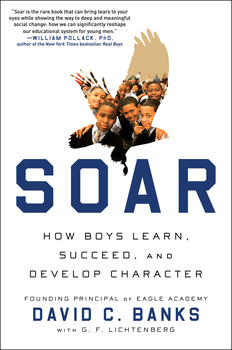
I knew I couldn’t create enough Eagle Academies. I had so many people came up to me, talked about, you need to write a book. I had never written a book; I couldn’t imagine the whole process. But I recognized just how critical it was. Most kids are not going to go to the Eagle Academy. I get that. So it became a matter of we’re not a perfect institution but we’ve learned some things about how to work with boys, how to get that light to go on. People need help, they need information and they need inspiration. I wrote Soar not so much for the kids, I wrote the book to educate and inspire adults. To help them transform the lives of boys and their sons, to help them become men.
